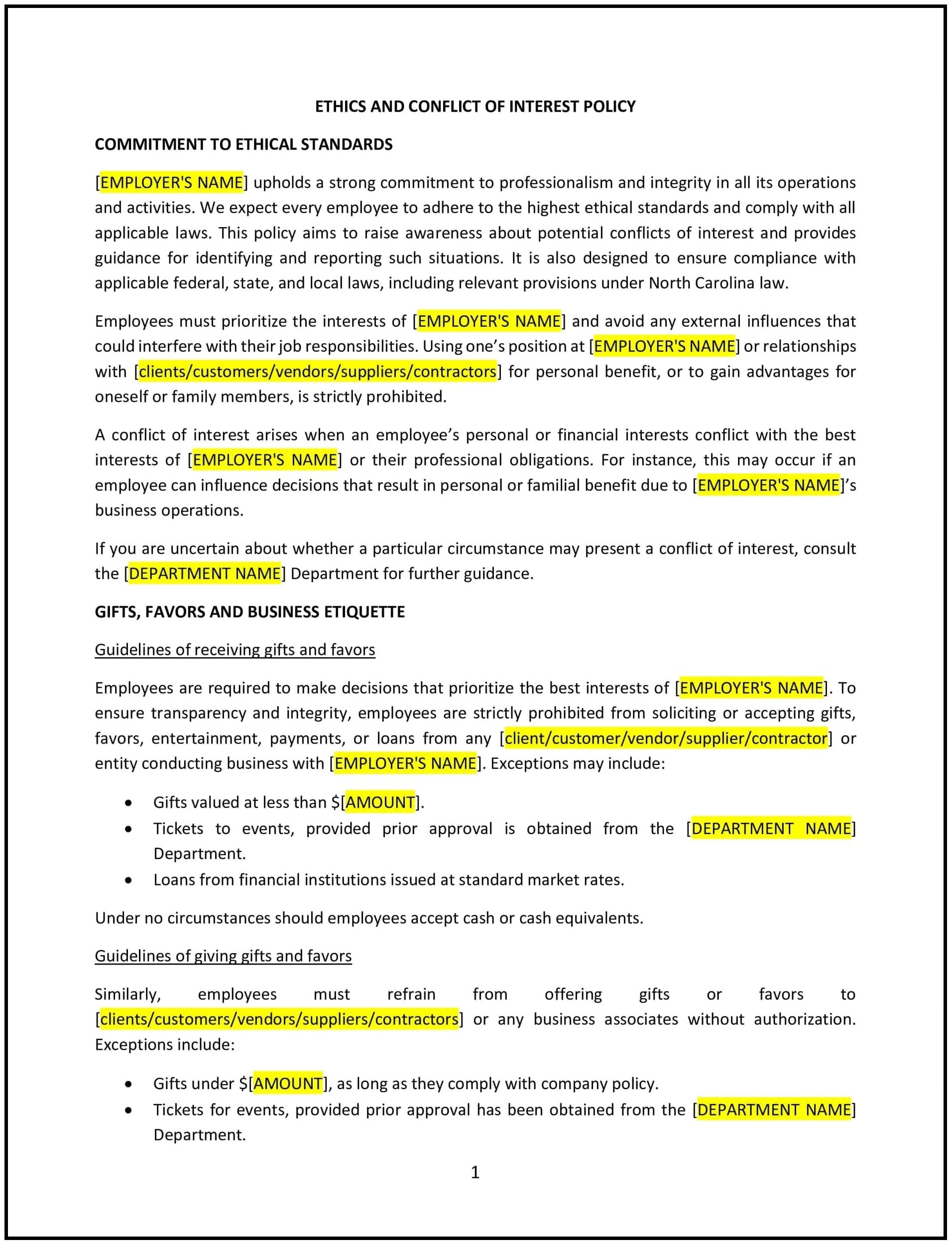Ethics and conflict of interest policy (North Carolina): Free template
Got contracts to review? While you're here for policies, let Cobrief make contract review effortless—start your free review now.

Customize this template for free
Ethics and conflict of interest policy (North Carolina)
An ethics and conflict of interest policy helps North Carolina businesses set clear guidelines for maintaining ethical conduct and ensuring that employees avoid situations where personal interests could conflict with the interests of the company. This policy defines what constitutes a conflict of interest, outlines how employees should disclose potential conflicts, and establishes procedures for addressing ethical concerns.
By adopting this policy, businesses can safeguard their reputation, foster trust within the organization, and promote a culture of transparency and integrity.
How to use this ethics and conflict of interest policy (North Carolina)
- Define conflict of interest: Clearly define what constitutes a conflict of interest, including situations where personal, financial, or familial interests could influence decision-making.
- Set disclosure requirements: Establish a process for employees to disclose any potential conflicts of interest, including timing (e.g., upon hiring, annually, or when a conflict arises).
- Address related-party transactions: Specify how the company will handle transactions or dealings involving related parties, such as family members, friends, or business associates.
- Provide examples: Offer specific examples of potential conflicts, such as working with a family-owned supplier or owning stock in a competitor.
- Establish corrective actions: Outline the steps the company will take if a conflict of interest is identified, including actions to mitigate or resolve the issue, such as recusal from decision-making or reassignment of responsibilities.
- Reflect North Carolina-specific considerations: Ensure that the policy complies with North Carolina’s ethical standards and any state-specific conflict of interest regulations.
Benefits of using this ethics and conflict of interest policy (North Carolina)
This policy provides several benefits for North Carolina businesses:
- Promotes integrity and transparency: Clear guidelines for handling conflicts of interest help build a workplace culture based on honesty, transparency, and ethical behavior.
- Reduces legal and financial risk: Addressing potential conflicts proactively reduces the likelihood of legal issues or reputational damage resulting from unethical conduct.
- Protects company assets and reputation: Ensures that business decisions are made with the best interests of the company in mind, preventing any personal interests from compromising company objectives.
- Builds trust with employees and clients: Demonstrating a commitment to ethical behavior builds trust with employees, clients, and stakeholders, contributing to long-term business success.
- Strengthens compliance: Helps businesses comply with North Carolina state laws and federal regulations regarding ethics and conflicts of interest.
Tips for using this ethics and conflict of interest policy (North Carolina)
- Communicate the policy clearly: Ensure that all employees understand the conflict of interest guidelines and how to disclose potential conflicts.
- Provide regular training: Offer ongoing training to employees on ethical decision-making, identifying conflicts of interest, and handling sensitive situations.
- Monitor and enforce compliance: Regularly review disclosures, investigate any concerns, and ensure corrective actions are taken when necessary.
- Review the policy regularly: The policy should be reviewed annually to ensure it complies with North Carolina’s laws and reflects any changes in company operations.